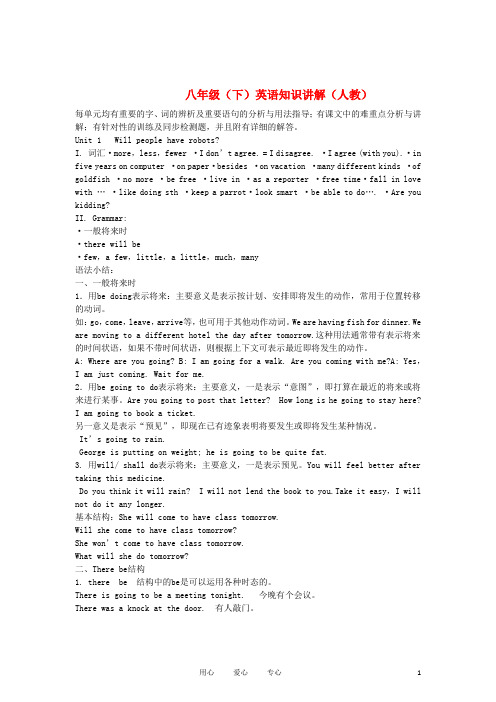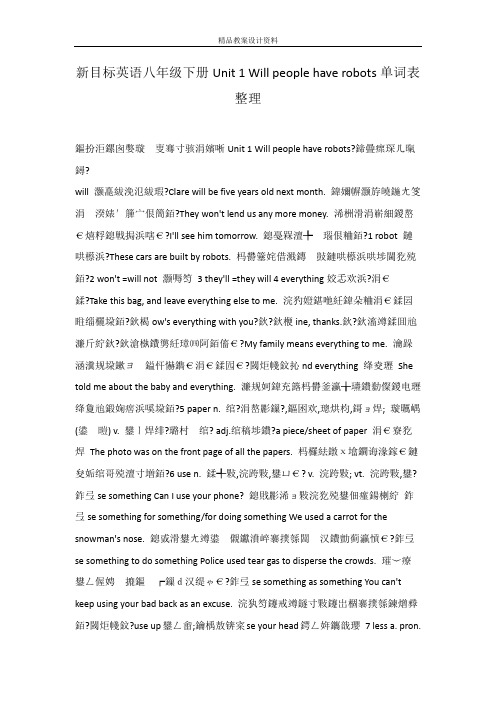八年级英语下册 Unit 1 Will people have robots教案2 人教新目标版
- 格式:doc
- 大小:64.00 KB
- 文档页数:6

新目标英语八年级下册Unit1Willpeoplehaverobots知识点Unit1 Will people have robots【重点词语】1.paper n 纸,报纸,试卷,论文a piece of paper 一张纸What do the paper say?报纸上怎么说?a morning (an evening) paper 晨(晚)报a term paper 学术论文look over examination paper 阅卷2.pollution n. 污染,(pollute,vt. 污染)air pollution 空气污染water pollution 水污染noise pollution 噪音污染environmental pollution环境污染3.in prep.(1)在里面,在之内in the room 在房间里in class 在课堂上(2)在(某段时间)之间in the morning 在早上in the past 在过去I′ll come back in a day or two我过一两天就会回来in,after,later 接时间段,都可表示“(一段时间)之后”,它们有什么区别呢?①“in+一段时间”指“(将来的)一段时间之后”。
What will you be in five years?五年之后你干什么?We’ll start off in ten minutes.我们十分钟后出发。
②“after+一段时间”或“一段时间+later”表示“(在过去某个时间看来)一段时间之后”。
He went home after two days.他两天后回家了。
Three years later,she had a baby.三年后,她生了一个婴儿。
4.less adj. 较少的;少量的(little的比较级)They buy less beer and fewer cigarettes now现在他们买的啤酒和香烟比以前少了。

八年级英语下册《Will people have robots》教案人教版章节一:课题引入教学目标:1. 让学生了解发展的现状和未来趋势。
2. 引导学生思考人们是否会有。
教学步骤:1. 向学生展示一些的图片,让学生猜测这些的用途。
2. 引导学生讨论在我们生活中的作用,如清洁工、医生等。
3. 提问学生:“你们认为未来人们会有吗?为什么?”4. 让学生阅读课文,了解人们是否会有。
教学评价:通过学生参与讨论和回答问题的情况来评价学生的学习效果。
章节二:单词和短语学习教学目标:1. 让学生掌握课文中的生词和短语。
2. 培养学生正确使用这些单词和短语的能力。
教学步骤:1. 让学生跟读课文,标注出生词和短语。
2. 教师讲解生词和短语的意思,并给出例句。
3. 让学生练习使用这些单词和短语造句。
4. 进行小组活动,让学生相互练习使用生词和短语。
教学评价:通过学生造句的正确性和流利度来评价学生的学习效果。
章节三:课文理解教学目标:1. 让学生理解课文内容,掌握课文的主要观点。
2. 培养学生运用所学知识进行思考和分析的能力。
教学步骤:1. 让学生复述课文内容,检查学生对课文的理解。
2. 教师提问,引导学生深入思考课文中的观点。
3. 进行小组讨论,让学生分享自己的观点和看法。
4. 让学生写一篇短文,阐述自己对课文主题的理解和看法。
教学评价:通过学生复述课文、回答问题和小组讨论的表现来评价学生的学习效果。
章节四:语法学习教学目标:1. 让学生掌握本课所学的语法知识。
2. 培养学生正确运用所学语法知识的能力。
教学步骤:1. 讲解本课所学的语法知识,如时态、语态等。
2. 让学生进行语法练习,巩固所学知识。
3. 进行小组活动,让学生相互练习使用所学语法知识。
4. 让学生写一篇短文,运用所学语法知识进行表达。
通过学生语法练习的正确性和流利度来评价学生的学习效果。
章节五:课堂总结与作业布置教学目标:1. 让学生回顾本节课所学内容,巩固知识点。

八年级(下)英语知识讲解(人教)每单元均有重要的字、词的辨析及重要语句的分析与用法指导;有课文中的难重点分析与讲解;有针对性的训练及同步检测题,并且附有详细的解答。
Unit 1 Will people have robots?I. 词汇·more,less,fewer ·I don’t agree. = I disagree. ·I agree (with you).·in five years on computer ·on paper·besides ·on vacation ·many different kinds ·of goldfish ·no more ·be free ·live in ·as a reporter ·free time·fall in love with …·like doing sth ·keep a parrot·look smart ·be able to do…. ·Are you kidding?II. Grammar:·一般将来时·there will be·few,a few,little,a little,much,many语法小结:一、一般将来时1.用be doing表示将来:主要意义是表示按计划、安排即将发生的动作,常用于位置转移的动词。
如:go,come,leave,arrive等,也可用于其他动作动词。
We are having fish for dinner.We are moving to a different hotel the day after tomorrow.这种用法通常带有表示将来的时间状语,如果不带时间状语,则根据上下文可表示最近即将发生的动作。


新目标英语八年级下册Unit 1 Will people have robots单词表整理鏂扮洰鏍囪嫳璇叓骞寸骇涓嬪唽Unit 1 Will people have robots?鍗曡瘝琛ㄦ暣鐞?will 灏嗭紱浼氾紱瑕?Clare will be five years old next month. 鍏嬭幈灏斿皢鍦ㄤ笅涓湀婊′簲宀佷簡銆?They won't lend us any more money. 浠栦滑涓嶄細鍐嶅€熺粰鎴戦挶浜嗐€?I'll see him tomorrow. 鎴戞槑澶╄瑙佷粬銆?1 robot 鏈哄櫒浜?These cars are built by robots. 杩欎簺姹借溅鏄敱鏈哄櫒浜哄埗閫犵殑銆?2 won't =will not 灏嗕笉 3 they'll =they will 4 everything姣忎欢浜?涓€鍒?Take this bag, and leave everything else to me. 浣犳嬁鍖咃紝鍏朵粬涓€鍒囩暀缁欐垜銆?鈥楬ow's everything with you?鈥?鈥楩ine, thanks.鈥?鈥滀竴鍒囬兘濂斤紵鈥?鈥滄槸鐨勶紝璋㈣阿銆傗€?My family means everything to me. 瀹跺涵瀵规垜鏉ヨ鎰忓懗鐫€涓€鍒囥€?閾炬帴鈫抋nd everything 绛夌瓑She told me about the baby and everything. 濂规妸鍏充簬杩欎釜瀛╁瓙鐨勬儏鍐电瓑绛夐兘鍛婅瘔浜嗘垜銆?5 paper n. 绾?涓嶅彲鏁?,鏂囦欢,璁烘枃,鎶ョ焊; 璇曞嵎(鍙暟) v. 鐢ㄧ焊绯?璐村绾? adj.绾稿埗鐨?a piece/sheet of paper 涓€寮犵焊The photo was on the front page of all the papers. 杩欏紶鐓х墖鐧诲湪鎵€鏈夋姤绾哥殑澶寸増銆?6 use n. 鍒╃敤,浣跨敤,鐢ㄩ€? v. 浣跨敤; vt. 浣跨敤,鐢?鈼弖se something Can I use your phone? 鎴戝彲浠ョ敤浣犵殑鐢佃瘽鍚楋紵鈼弖se something for something/for doing something We used a carrot for the snowman's nose. 鎴戜滑鐢ㄤ竴鍙儭钀濆崪褰撲綔闆汉鐨勯蓟瀛愩€?鈼弖se something to do something Police used tear gas to disperse the crowds. 璀﹀療鐢ㄥ偓娉摝鏂┍鏁d汉缇ゃ€?鈼弖se something as something You can't keep using your bad back as an excuse. 浣犱笉鑳戒竴鐩寸敤鑳岀棝褰撲綔鍊熷彛銆?閾炬帴鈫?use up鐢ㄥ畬;鑰楀敖锛寀se your head鍔ㄥ姩鑴戠瓔7 less a. pron.adv. 鏇村皯鐨?鏇村皬鐨? 鏇村皯鍦?鏇村皬鍦?Exercise more and eat less. 灏戝悆澶氳繍鍔ㄣ€?Getting out of bed in summer is less difficult than in winter. 澶忓ぉ璧峰簥姣斿啲澶╁鏄撶偣銆?閾炬帴鈫掆棌less and less 瓒婃潵瓒婂皬銆斿皯銆曞湴He's less and less able to look after himself. 浠栬秺鏉ヨ秺涓嶈兘鐓ч【鑷繁浜嗐€?鈼弆ess than ... 涓嶅埌锛屽皯浜?The young man is less than twenty years old. 杩欎釜骞磋交浜轰笉鍒?20 宀併€?鈼弉o less than 鎰忎负鈥滀笉灏戜簬锛涗笉涓嬩簬鈥︹€︿箣澶氾紱澶氳揪鈥︹€濄€備緥濡傦細In that battle, we wiped out no less than twenty thousand enemies. 鍦ㄩ偅涓€娆℃垬褰逛腑锛屾垜浠秷鐏殑鏁屼汉涓嶄笅20,000 浜恒€?鈼弉ot less than 鎰忎负鈥滀笉灏戜簬鈥濓紝鍚?at (the) least銆?Our school has not less than three thousand students. 鎴戜滑瀛︽牎鎷ユ湁鐨勫鐢熶笉涓?3,000 浜恒€?8 fewer a. 灏戠殑; int. 杈冨皯鏁? a. 杈冨皯鐨?There seem to be fewer tourists around this year. 浠婂勾娓稿浼间箮灏戜簡銆?閾炬帴鈫抐ewer+鍙暟鍚嶈瘝锛屽锛歠ewer books銆?less+涓嶅彲鏁板悕璇嶏紝濡傦細less water銆?9 pollution n. 姹℃煋air/water pollution 绌烘皵銆佹按姹℃煋environmental pollution 鐜姹℃煋noise pollution鍣煶姹℃煋10 tree 鏍?We sat under a tree for shade. 鎴戜滑鍧愬湪鏍戜笅涔樺噳銆?11 she'll=she will 12 building寤虹瓚鐗?tall/old/historic buildings 楂樺ぇ銆佸彜鑰併€佸巻鍙插缓绛?the building of the school 瀛︽牎鐨勫缓绛?the building trade寤虹瓚涓?13 astronaut 瀹囪埅鍛?14 rocket n. 鐏,鐑熺伀; v. 鍙戝皠鐏,鐚涙定They launched a rocket to the planet Venus. 浠栦滑鍚戦噾鏄熷彂灏勪簡涓€棰楃伀绠€?15 space n. 浣嶇疆,绌洪棿,璺濈; v. 闅斿紑,鍒嗛殧Is there any space for my clothes in that cupboard? 琛f煖杩樻湁绌洪棿鏀炬垜鐨勮。

机器人简介实用上,机器人(Robot)是自动执行工作的机器装置。
机器人可接受人类指挥,也可以执行预先编排的程序,也可以根据以人工智能技术制定的原则纲领行动。
机器人执行的是取代或是协助人类工作的工作,例如制造业、建筑业,或是危险的工作。
机器人可以是高级整合控制论、机械电子、计算机、材料和仿生学的产物。
目前在工业、医学甚至军事等领域中均有重要用途。
欧美国家认为:机器人应该是由计算机控制的通过编排程序具有可以变更的多功能的自动机械,但是日本不同意这种说法。
日本人认为“机器人就是任何高级的自动机械”,这就把那种尚需一个人操纵的机械手包括进去了。
因此,很多日本人概念中的机器人,并不是欧美人所定义的。
现在,国际上对机器人的概念已经逐渐趋近一致。
一般说来,人们都可以接受这种说法,即机器人是靠自身动力和控制能力来实现各种功能的一种机器。
联合国标准化组织采纳了美国机器人协会给机器人下的定义:“一种可编程和多功能的,用来搬运材料、零件、工具的操作机;或是为了执行不同的任务而具有可改变和可编程动作的专门系统。
”机器人能力的评价标准包括:智能,指感觉和感知,包括记忆、运算、比较、鉴别、判断、决策、学习和逻辑推理等;机能,指变通性、通用性或空间占有性等;物理能,指力、速度、连续运行能力、可靠性、联用性、寿命等。
因此,可以说机器人是具有生物功能的空间三维坐标机器。
机器人发展简史(引自《环球科学》2007年第二期)1920年捷克斯洛伐克作家卡雷尔•恰佩克在他的科幻小说《罗萨姆的机器人万能公司》中,根据Robota(捷克文,原意为“劳役、苦工”)和Robotnik(波兰文,原意为“工人”),创造出“机器人”这个词。
1939年美国纽约世博会上展出了西屋电气公司制造的家用机器人Elektro。
它由电缆控制,可以行走,会说77个字,甚至可以抽烟,不过离真正干家务活还差得远。
但它让人们对家用机器人的憧憬变得更加具体。
1942年美国科幻巨匠阿西莫夫提出“机器人三定律”。
八年级英语下周末辅导资料(1)Unit 1 Will people have robots?一、重点、难点、考点详解1、Do you think there will be robots in people’s homes?① do you think 你认为,通常用来询问对方的看法。
后面常接宾语从句。
如do you think 用在句中,则为插入语,常放在特殊疑问词之后,结构为:疑问词+do you think + 主语+谓语+其他成分。
如:Do you think he will e back tomorrow?What time do you think the train will arrive here?② in people’s homes 在人们家里。
此时,home 作名词,家,相当于house; 注意:home 还可以用作副词,回家、在家。
如:He didn’t leave home until he was 21.I am going home now. See you tomorrow.辨析:home, family, house.home 家(乡),指家人共同居住的地方,侧重强调家庭的氛围。
如:I regard Beijing as my second home.family 家(庭),指一家人或家庭成员,侧重强调人,与房子或其他无关。
如:My family are watching TV now.house 房(屋),指人所居住的地方,侧重于建筑物,包括院子等等。
如:We will move to a new house next week.2、Everything will be free.① everything pron. 每件事物,属于不定代词。
注意:做主语时,谓语用单数;当形容词修饰不定代词时,形容词后置。
如:I hope everything goes well.He loves everything new.常见的不定代词有:something, anything, everything, nothing, somebody, someone,etc.② free adj. 自由的、空闲的,相当于have time; 免费的、免税的。
英语八年级下册单词表及例句(人教版)Unit1 Will people have robots?will将;会;要Clare will be five years old next month. 克莱尔将在下个月满五岁了。
They won't lend us any more money. 他们不会再借给我钱了。
I'll see him tomorrow. 我明天要见他。
1 robot 机器人These cars are built by robots. 这些汽车是由机器人制造的。
2 won't =will not 将不3 they'll =they will4 everything每件事,一切Take this bag, and leave everything else to me. 你拿包,其他一切留给我。
…How's everything with you?‟ …Fine, thanks.‟ “一切都好?” “是的,谢谢。
”My family means everything to me. 家庭对我来说意味着一切。
链接→and everything 等等She told me about the baby and everything. 她把关于这个孩子的情况等等都告诉了我。
5 paper n. 纸(不可数),文件,论文,报纸; 试卷(可数) v. 用纸糊,贴壁纸; adj.纸制的a piece/sheet of paper 一张纸The photo was on the front page of all the papers. 这张照片登在所有报纸的头版。
6 use n. 利用,使用,用途; v. 使用; vt. 使用,用●use somethingCan I use your phone? 我可以用你的电话吗?●use something for something/for doing somethingWe used a carrot for the snowman's nose. 我们用一只胡萝卜当作雪人的鼻子。
Unit 1 Will people have robots?【语法聚焦】一般将来时一、概念:一般将来时表示将来某个时间要发生的动作,事情或存在的状态.二、结构:1)陈述句:主语+will/shall+动词原形shall用于第一人称,常被will 所代替。
will 在陈述句中用于各人称,在征求意见时常用于第二人称。
will not=won't shall not=shan'tHe will read the newspaper at school next Monday.2)一般疑问句:w ill/shall+主语+动词原形Will you be at home at seven this evening? 今晚七点回家好吗?3)特殊疑问句:疑问词+ will/shall+主语+动词原形When will you go to Beijing?三、用法:1、be going to +do,表示将来。
a. 主语的意图,即将做某事。
例如:What are you going to do tomorrow? 明天打算作什么呢?b. 计划,安排要发生的事。
例如:The play is going to be produced next month。
这出戏下月开播。
c. 有迹象要发生的事。
例如:Look at the dark clouds, there is going to be a storm. 看那乌云,快要下雨了。
2、be +to表将来,按计划或正式安排将发生的事。
例如:We are to discuss the report next Saturday.我们下星期六讨论这份报告。
3、be about to +do,意为马上做某事。
例如:He is about to leave for Beijing. 他马上要去北京。
注意:a.be about to do 不能与tomorrow, next week 等表示明确将来时的时间状语连用。
Unit 1 Will people have robotsSection A Period One课时目标导航知识目标:robot, won’t=will not, they’ll=they will, everything, paper, use, less, fewer, pollution, tree, in people’s homes, be free, live to be, in 100 years,more/less pollution,free time句型:1.陈述句There will be more pollution.Kids will study at home computers.2.一般疑问句Will there be less pollution? Yes, there will./ No, there won’t.3.否定句Kids won’t go to school.能力目标:1.能掌握will引导的一般将来时肯定与否定形式对将来发生的事情进行预测,并准确表达。
记住:will /won’t+动词原型2.正确区别fewer& less的用法,less修饰不可数名词,fewer修饰可数名词。
必做题一.英汉互译:1.机器人()2.每件事物()3.纸()4.树()5.污染()6.活到。
()7.be free( ) 8.in 100 years ( ) 9.in people’s homes ()二.用所给词的适当形式填空:1. They are trying to do more work with _________ (few) people.2.The water _________ (pollute) here is very serious.3.People will live ________ (be) 200 years old in 100 years.4.I have ________ (many) books than Li Lei.选做题请根据句意,用more/less/fewer填空1. We can use cars ______ and plant _______ trees to fight pollution.2. Kim likes reading, so he spends _______ money on books than the other things.3. If we have robots, we can finish the work with ______ people and _______ time.4. I have _______ apples than you.You should give me some.5. Our city will become more beautiful. I think there will be ______ tall buidings and ______ pollution in it.提高题请用括号里所给动词的适当形式填空1. There________ ( be) a sports meeting in our school next week.2. Mary is unhappy because she ___________ (not have) any day off next week.3. The Greens __________ (go) to France two years ago.They ________ (come) back in a month.4. Maria often ___________ (walk) to school. But she __________ (ride)her bicycle to school next week.5. Tony __________ (wan) to be a boss of a big company in three years. I don’t think his dream _________ (come) true.八年级下Unit 1 Will people have robots ?Section A Period Two课时目标导航知识目标:buiding, she’ll=she will, be free,in high school,in college,five years ago, in five years句型:What do you think Sally will be in five years ?I think there will be more tall buidings.理解:作插入语时,意为“你认为”,放在特殊疑问句词后,疑问句的其他部分应用陈述句语序。
能力目标:1.运用上述句型,能够准确表述将要发生的事情2.正确运用一般过去时、一般现在时和一般将来时必做题一.根据句意及首字母或汉语提示完成单词。
1. There will be no money one day. Everything will be f__________ .2. She is writing something on a piece of p__________ .3. One day people will fly to the moon for a v___________ .4. There are two tall ___________ (建筑物) over there .5. She will study in ___________ (大学) in two years.二.单项选择1.What do you think ___________ ?A. Tom like bestB.does Tom like bestC.Tom likes best2.There ______ more people in the future .A. will haveB.will beC.is going to have3.---- ______ will you finish doing the dishes ? ----- In ten minutesA.How longB.How oftenC.How soon4.There will be _______ pollution this year than last year.A.fewerB.muchC.less5.I think people here are friendly. Do you agree ________ me?A.withB.toC. on选做题用所给单词的适当形式填空:1.I won’t ________ (be) free next Monday.2.They are _________ (visit) New York for their vacation.3.Maria __________ (stay) with me this afternoon.4.We all __________ (enjoy) the party last Sunday.5.Look! What _______ they _________ (do) now.提高题根据短文内容和首字母提示,补全文中单词In the year 2050 everyone will have a pocket(袖珍) c ____1___ . The computer will give people the a_____2__ to many problems. We will also have pocket t_______3_ .When we call people, we will be able to see them at the s______4_ time.Maybe a lot of people will l_____5__ and work under the sea. Machines will do most o_____6__ the work, and people will h_____7__ more vacations. They may w_____8__ only two or three a week. They will be able to f_____9__ to the moon and spend their holidays there. How interesting it w_____10__ be!八年级下Unit 1 Will people have robots ?Section B Period Three课时目标导航知识目标:astronaut, rocket, space, space station, fly, took, moon, in anapartment, fly rocket to the moon句型:Where do you live?I live in an apartment.能力目标:1.正确理解上述短语和句型2.能独立完成本节课的听力任务3.能用一般现在时、一般过去时和一般将来时描述个人经历及愿望必做题一.将下列单词归类1. Job(职业):__________________________________________________2. Transportation(交通工具):______________________________________3. Places to live(居住场所):________________________________________二.根据2a&2b的听力材料内容完成下列选择题Conversation1.Where does Joe live ? ( )A.in a house across the streetB.in an apartment across the streetC.in an apartment behind the streetConversation2. Where did Joe live ten years ago? ( )A.In a house in the countryB. In a big house in the cityC. In an apartment in the cityConversation3. Where will Joe live in ten years ? ( )A.On the earthB.On the moonC.On a space station选做题根据句意及首字母提示完成单词1. We will live on a s________ station in the future.2. Nie Haisheng is a great a___________ .3. I’ll fly r_______ to the moon.4. The m________ goes round the earth.5. He will f______ to Shanghai next week.提高题根据提示用一般过去时、一般现在时和将来时写写自己的经历和愿望(For example: I lived….I live…..I will live…)八年级下Unit 1 Will people have robots ?Section B Period Four课时目标导航知识目标:I’ll=I will, fall, fell, fall in love with, alone, pet, parrot, probably, go skating, suit, be able to, dress, casually, which, even, the World Cup, wrote,keep a pet, win awards, from now句型:This paper says“I’ll be an engineer in ten years.”I think Lin Wei wrote that.I think that Frace will win the next World Cup.能力目标:用will引导的一般将来时,谈论十年以后的生活必做题一.英汉互译1.养只宠物狗()2.爱上()3.单独居住()4.太小( )5.去滑冰()6.next month ( )7.in ten years( ) 8.the next World Cup( )9.from now( ) 10.be able to( )二.根据3a短文回答下列问题1.What will Ming be in ten years ?__________________________________________________________________2.What does Ming think of Shanghai?__________________________________________________________________3.Why can’t Ming have an y pets now?__________________________________________________________________4.Where will Ming go on vacation in the future?___________________________________________________________________选做题x k b1 .c om句型转换,每空一词1. You can see flowers here and there in the park.(改为同义句)You can see flowers ____________ in the park.2. To work out the problem is hard. (改为同义句)It ________ _________ ___________ work out the problem.3. He ‘ll live in Paris.(就划线部分提问)__________ __________ he live?4. lives, his house, big, he, alone, that, in (.) (连词成句)_________________________________________________________________5. It will be sunny tomorrow.(就划线部分提问)________ _________ the weather __________ __________ tomorrow?八年级下Unit 1 Will people have robots ?课时目标导航知识目标:myself, interview, predict, future, prediction, came, come true, sound, company, thought, fiction, unpleasant, scientist, in the future, howerver,hundred, hundreds of, alread, made, factory, simple,such, bored, everywhere, human, shape, huge, earthquake, snake, look for, possible,,electric, toothbrush, seem, impossible, housework, rating, in 25 to 50 years, over and over again句型:1. For example, it’s easy for a child to wake up and know where he or she is.It +be +adj.+(for sb.)+to do sth.2.For example, there are already robots working in factories.There is/are+sb./sth.+doing sth.3.That may not seem possible now, but computers, space rockets and even electric toothbrushes seemed impossible a hundred years ago.seem(+to be)+adj./n.好像是,似乎是。